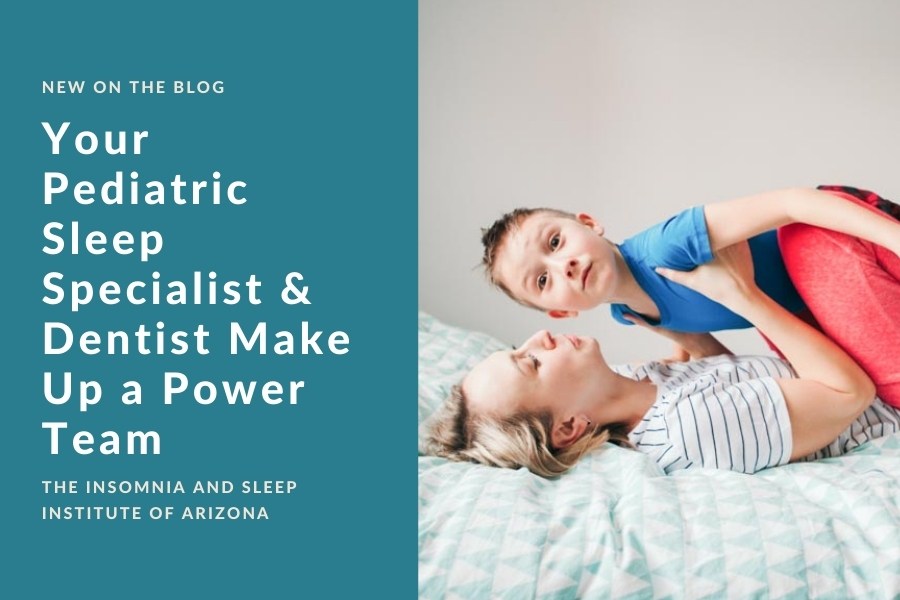It is important for parents to create a “dream team” for their child’s health and well-being, and with so many children struggling with sleep disorders a pediatric sleep specialist is a must for many families. The Insomnia and Sleep Institute of Arizona treats pediatric patients as young as two years old. We are staffed by sleep specialists who focus on sleep medicine and have been voted “Top Doc” in the area for six consecutive years. We are an outcome-driven sleep clinic that prioritizes the right diagnosis during your consultation with a sleep specialist so that the right testing and treatment can follow. However, if you are the parent of a child with a sleep disorder, it’s critical to bear in mind that a holistic team of experts is the best approach to caring for your child—and, surprisingly, that might also include a dentist.
A recent article in Sleep Review covered the journey of dentist Diana Batoon, who is the mother of a child with sleep apnea. When a pneumologist suggested antidepressants for treating sleep apnea, she was taken aback because she didn’t want to start depending on medications at such a young age (and particularly antidepressants). Instead, she delved into the science behind why sleep apnea occurs, especially in children, and found what we at The Insomnia and Sleep Institute know and practice. When you complement behavioral interventions with “appliance therapy,” such as CPAP technology, that’s the avenue for better quality sleep.
One Pediatric Sleep Disorder Journey
Batoon saw that as her child’s sleep improved, so did his school performance and even his eczema. She was further inspired to embed “dental sleep medicine” into her strategy given her background. It is estimated that 90 percent of kids who have some type of sleep-disordered breathing (also known as SDB), and which includes obstructive sleep apnea, are not diagnosed. Instead, the symptoms of these disorders are taken as behavioral concerns—particularly ADHD. When behaviors are actually caused by a sleep disorder, it is unlikely that the child will outgrow these behavioral problems.
How Pediatric Sleep Disorders are Different
Snoring has long been considered the tell-tale sign of sleep apnea, but this is often only true in adults. A child who has OSA might not snore but could breathe heavily at night. They might also be restless when they are asleep and parents might be able to notice breaks in breathing. Some of the most common comorbidities of sleep apnea in children can also include growth impairment, type-2 diabetes, metabolic issues, bedwetting, and abnormalities with hormones. It is important not to dismiss the possibility of OSA just because a child doesn’t snore. Sometimes the airway’s blockage happens in the lower part rather than the upper airway, which means that snoring does not occur.
When it comes to working with a dentist along with your sleep specialist, making sure your pediatric dentist understands the connection between pharyngo-orofacial disorders and sleep disorders is essential. What is the physiological makeup of the upper airway? A dentist can help to determine any risks, and increasingly dentists are the ones initially screening for airway issues (this is because most children will see a dentist at least once a year, but most parents will only take their children to a sleep specialist when a sleep disorder is seemingly obvious).
Caring for Your Child’s Sleep Disorder
Since sleep apnea can seriously damage a child’s growth and potential, it’s imperative to make sure you have the right experts on your side. Dentists must understand that sleep apnea is not simply an anatomic disease from a narrow airway, but instead check for obesity, large tonsils, and consider genetic conditions. Asking about daytime fatigue as a screening question is becoming more common in dental clinics. Dentists might be able to spot anatomy abnormalities and issues with a neuromuscular function such as a mandible malformation or hypoplastic maxilla.
Of course, you can also just schedule a consultation for your child today as there is no need for a referral to see the sleep specialists at The Insomnia and Sleep Institute. When treating pediatric sleep disorders is successful, confidence and success can dramatically increase. If you’re concerned about your child’s sleep, schedule a consultation today at The Insomnia and Sleep Institute by calling the office or completing the online form.





